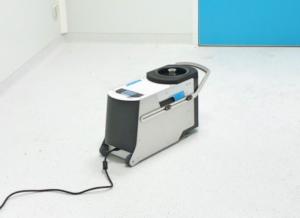

The rise of the so-called ‘superbug’ has led to a much greater awareness of the need for effective cleaning in hospitals and other healthcare locations where already-vulnerable patients are at risk of infection. The same applies to laboratories which handle materials which are potentially hazardous to human health.
Here Tecomak Environmental Services, who use airborne disinfection methods as part of their biological decontamination services, look at why this process and the Phileas® units they use (pictured) are much better than relying on manual cleaning.
The Problems with Manual Cleaning
If hospitals and other healthcare locations rely on manual methods to clean their premises, then the cleaner could be exposed to the risk of infection. A multi-centre study commission by experts at the University of Nottingham showed that manual decontamination only removed about half of the pathogens in patient isolation rooms in more than 20 acute care hospitals. There is also the potential for human error, as surfaces and areas can easily be missed during the cleaning process.
Manual cleaning, while good at removing physical debris and disinfecting flat, easily accessible surfaces, is not so efficient at decontaminating hard-to-reach areas. In hospitals, research labs, cleanroom environments and pharmaceutical locations, there can be a lot of confined spaces and complex medical equipment which can be difficult to disinfect.
There is also evidence to suggest that manual cleaning with a cloth and biocide solution can cause bacteria to spread rather than eliminate it.
The Advantages of Airborne Disinfection
Manual cleaning is not recommended as the best or sole method of decontamination for sensitive areas. An airborne disinfection system relies on proven chemical reactions rather than human beings, so there is little chance of human mistakes affecting the process.
Problems of infection can be contained or eradicated much more quickly with an airborne disinfection system, and the chance of future outbreaks at the same location are drastically reduced.
The Particular Merits of Phileas Units
Phileas® products are among the most effective in helping reduce the spread of healthcare-associated infections, according to a report prepared by environmental decontamination expert John Curtin.
Tests carried out by the UK government in 2018 showed that only systems which used formaldehyde delivered similar or better results to Phileas® units; however, the latter were much safer as, unlike formaldehyde, there was no risk to human health.
These hydrogen peroxide decontamination systems diffuse disinfectant via a fine mist. Once the hydrogen peroxide decontamination process has been completed all that remains are harmless oxygen molecules and water.
They are efficient and have fast operating cycles – the battery-operated smaller units can decontaminate up to 45 cubic metres within two and a half hours, while the largest machine, the Phileas® 250, takes around the same time to decontaminate a larger space.
This means research and production labs, wards, operating theatres and other healthcare locations will be out of action for comparatively short periods of time. This is important when lives are at risk or production processes are being disrupted.
Phileas® units come in a range of sizes, so there will be one which suits your needs. The Phileas® 250 can decontaminate multiple rooms such as wards with multiple rooms and industrial-sized labs, while the Phileas® Genius is ideal for individual items of equipment such as safety cabinets, isolators, freeze dryers and double-door locks.
The Phileas® 75 and the Phileas® 25 can disinfect medium-sized areas such as standard patient rooms and wards, surgical suites and high-risk areas such as intensive care and high dependency units.
All Phileas® airborne disinfection units can be pre-programmed and operated remotely so there is no need to put cleaning staff at risk of infection. All Phileas® units comply with the requirements of the EU Biocide Product Regulations.
Phileas® Units from Tecomak
If you would like to know more about our biological decontamination services or our Phileas® units, then Tecomak Environmental Services are happy to advise you. You can contact us by following this link and completing our online form or by calling us on 01732 852250.